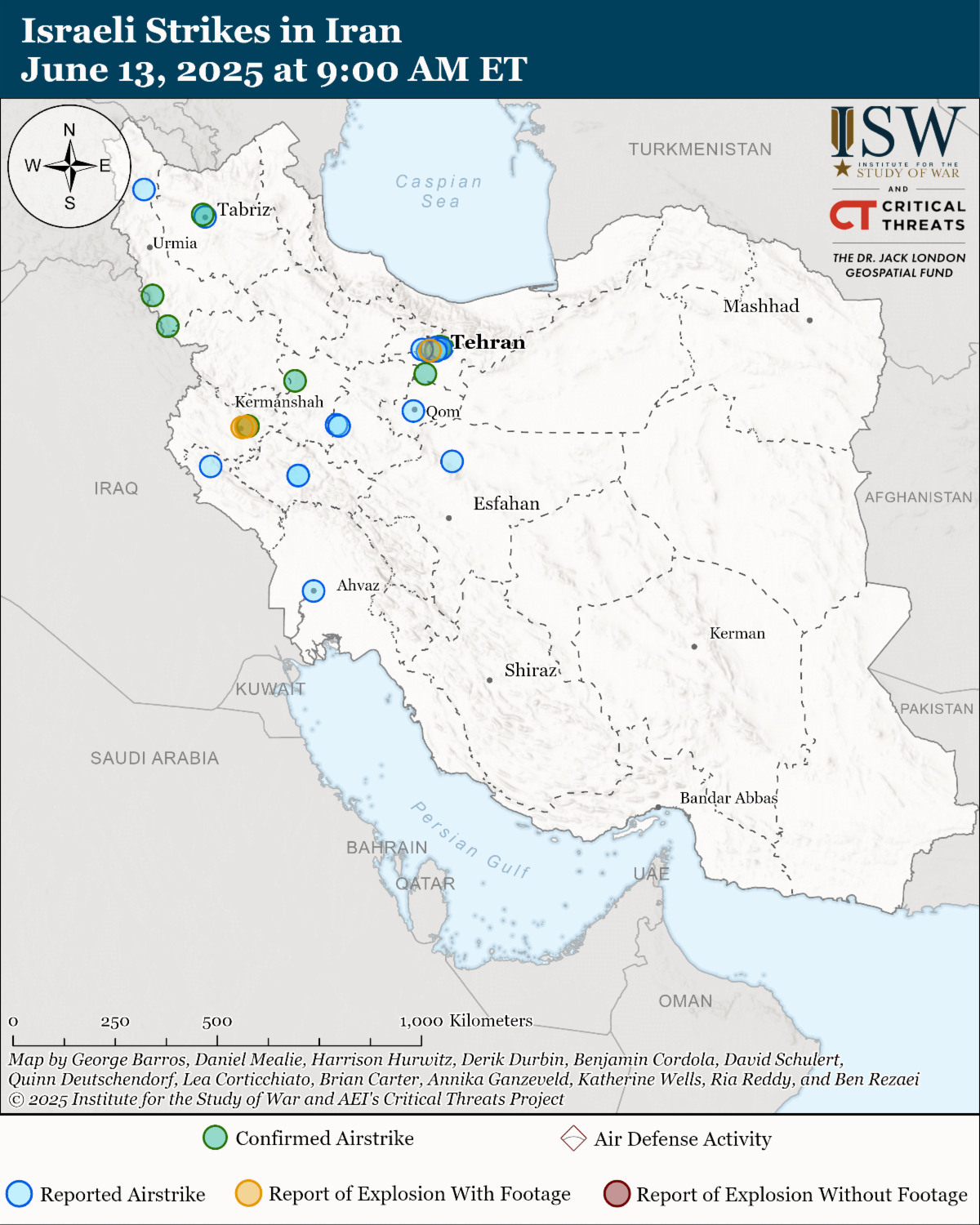Iranian Supreme Leader Ali Khamenei published a brief and generic statement following the Israeli strikes, condemning the attacks and vowing to retaliate. Khamenei provided no specificity regarding an Iranian retaliation.
Israel conducted covert operations targeting Iranian ballistic missile launchers, which likely hampered Iran’s ability to retaliate with ballistic missiles in the immediate aftermath of the strikes. Israel reportedly built a secret one-way attack drone base in Iran, which it used to strike Iranian ballistic missile launchers near Tehran on June 12. The Israel Defense Forces (IDF) Air Force likewise struck Iranian ballistic missile sites. Iran responded to the Israeli air campaign by launching over 100 drones at Israel from Iran about six hours after the initial Israeli strikes. Local Syrian sources reported that Iranian missiles landed in Syria, but CTP-ISW cannot confirm whether the sources saw Iranian missiles or fallen interceptor missiles. Iranian leaders’ likely decision to not use ballistic missiles in their response was likely not voluntary and rather a result of Israel’s covert drone operations that disabled a significant number of Iranian ballistic missile launchers. Iran claimed on June 11 that it had finalized plans for an “immediate counterstrike” against Israel that would involve hundreds of ballistic missiles, but may have only been able to enact part of its plan due to degraded capabilities.
Iranian leaders likely learned lessons about the limits of drone attacks on Israel from its two large-scale direct attacks on Israel in April and October 2024, which makes it unlikely that Iran would choose to only use drones to retaliate against Israel. Iran launched hundreds of ballistic and cruise missiles and one-way attack drones targeting Israel in April 2024, but US and partner defenses intercepted the vast majority of the slow-moving drones. Iran had likely sought to use cruise missiles and drones to overwhelm and defeat Israeli air defenses while the ballistic missiles destroyed targets in the April attack, but the theory failed. Iran learned from the April 2024 attack and employed only ballistic and cruise missiles in its somewhat more successful October 2024 attack targeting Israeli military sites. It is therefore unlikely that Iran would decide to only use drones to attack Israel in response to the recent Israeli airstrikes, given that it has learned that drones are less effective against Israel than large amounts of ballistic and cruise missiles. Israeli media stated that the IDF intercepted all Iranian drones targeting Israel on June 13, which underscores how Israel’s attacks on Iranian ballistic missile launchers likely caused Iran to have to conduct an underwhelming immediate retaliation against Israel.
Key Takeaways:
- Iranian Supreme Leader Ali Khamenei published a brief and generic statement following the Israeli strikes, condemning the attacks and vowing to retaliate.
- Israel conducted covert operations targeting Iranian ballistic missile launchers, which likely hampered Iran’s ability to retaliate with ballistic missiles in the immediate aftermath of the strikes. Israel reportedly built a secret one-way attack drone base in Iran, which it used to strike Iranian ballistic missile launchers near Tehran on June 12.
- In addition to striking nuclear and military infrastructure, Israel has conducted a decapitation campaign targeting Iranian military leadership.
| 




 [ISW] 러시아의 공세 캠페인 평가, 2025년 6월 13일
[ISW] 러시아의 공세 캠페인 평가, 2025년 6월 13일
 [ISW] 스페셜 리포트 | 이스라엘의 이란 공격: 이란 업데이트, 20...
[ISW] 스페셜 리포트 | 이스라엘의 이란 공격: 이란 업데이트, 20...